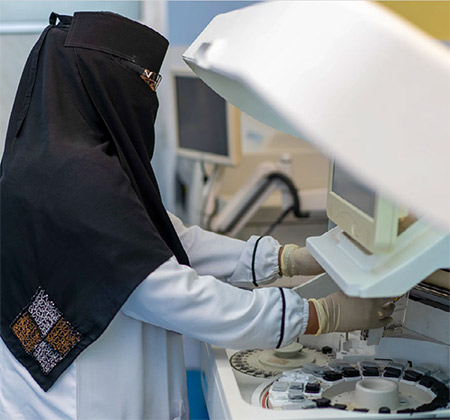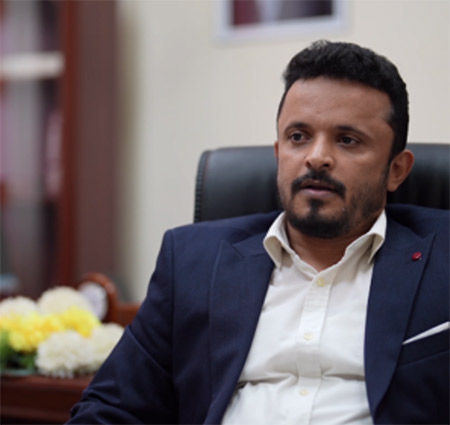 A laboratory technician at the Aden CPHL which is supported by the World Bank. Photo credit: WHO Yemen
A laboratory technician at the Aden CPHL which is supported by the World Bank. Photo credit: WHO Yemen
15 September 2024, Aden, Yemen – Since 2017, the World Bank and WHO have made major investments in Yemen’s central public health laboratories (CPHLs).
Detecting outbreaks and monitoring the health of people with chronic diseases are among the many important roles played by CPHLs.
“These centres functioned well before the conflict, but by 2017 only 1 CPHL remained, in Sana’a. Now Yemen has 12 CPHLs across the country, serving more than 800 000 Yemenis annually,” explained WHO Representative to Yemen Dr Arturo Pesigan.
When the Director-General of the National Centre for CPHLs in Aden Dr Wahid Abdullah Al-Bakhshi took up his role in 2023 he immediately started to look for ways to increase the return on investments made by WHO, the World Bank and other partners.
Supported by his former professor Dr Saeed Shaibani, laboratory National Professional Officer for WHO Yemen and a former national Director-General of CPHLs, Dr Wahid prioritized motivating and building the capacities of his team of 75 laboratory staff in Aden, and 259 laboratory workers across CPHLs in Marib, Mukalla, Sayoun, Shabwah and Taiz.
Faced with a funding shortfall, Dr Wahid appealed to businesspeople and local community leaders. Through resourceful fundraising was able to establish a training room for 80 people which now generates income by hosting events.
He prioritized improving cold chain capacities by rehabilitating warehouse spaces and making full use of the refrigerators for PCR reagents provided by WHO and the World Bank in 2022 as part of the Yemen COVID-19 Response Project, minimizing wastage associated with improper storage.
He enhanced the CPHL’s Food and Water Department, leveraging WHO’s and the World Bank’s 2021 investments in atomic absorption spectroscopy under the Emergency Health and Nutrition Project. The Department now plays a key role in investigating outbreaks and identifying food- and water-borne bacteria. The Department also helps generate revenue by testing food products, including fish, for the export market.
 Director-General of the National Centre for CPHLs in Aden Dr Wahid Abdullah Al Bakhshi. Photo credit: WHO Yemen
Director-General of the National Centre for CPHLs in Aden Dr Wahid Abdullah Al Bakhshi. Photo credit: WHO Yemen
Adhering to environmental and social standards, Dr Wahid enforced strict waste management practices. Waste management staff now use a waste autoclave and have a contract with the Jumhouria Governorate Hospital to use its waste treatment unit twice a week.
Going forward, WHO and the Ministry of Public Health and Population are rolling out an information system to improve the flow of data and samples from other governorates to Aden CPHL and, with financing from the Pandemic Fund via the Pandemic Preparedness and Response Project (PPRP), are working on strengthening antimicrobial resistance surveillance.
Through PPRP and the World Bank funded Emergency Human Capital Project, WHO will continue to support CPHLs with reagents and other supplies.
Related links:




